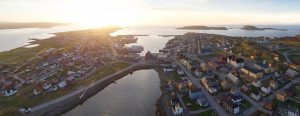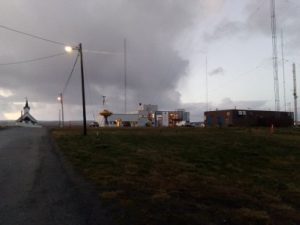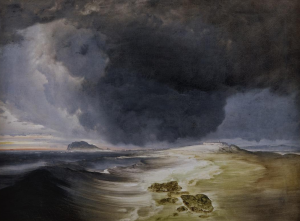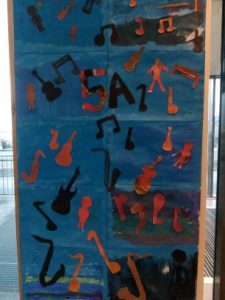Vardø (Source: http://www.vardo.kommune.no/)
Vardø is the easternmost town in Norway, the only one situated in the polar climate zone with zero summer days: the average temperature remains below +10 °C all along the year.
Originally a fishing village, Vardø has been a town since ca. 1530. The area has been settled since the 800’s. Now with approximately 2000 habitants, the main sources of income include fishing and seafood processing. The importance of tourism is also growing. Offshore oil production and the shipping activities related to the industry could provide jobs and economic growth in Vardø. Having interviewed some of the Vardø municipal council officers, it becomes clear that Vardø is an important point in terms of providing services for possible offshore operations. For example, Vardø Vessel Traffic Service Center monitors ship traffic in Northern Norway and is essential in terms of oil spill risk monitoring as well as response and preparedness.
Vardø Vessel Traffic Service Center
The safety risks in drilling in the Arctic waters seem quite immense in my eyes, especially considering the weather and the darkness in the winter months. Already in Vardø, I feel out slightly out of my element – I am far from home, the darkness arrives when I am still eating my lunch, and the strong wind almost wipes me off my feet. It’s difficult to even imagine the actual conditions of working on an offshore installation.
Vardøhus fortress (Peder Balke, c. 1860)
The locals, however, don’t seem to mind. In fact, the yearly Winter Blues- festival is about to start in the town and the first event is the opening of an art exhibition in the new municipality building. I even meet a fellow Finn, who tells me the weather is pretty nice at the moment, apparently “the grandmothers don’t even close the upper button of their shirts yet”. All the same, I fly back to Oslo with a hefty flu…
Art work by school children in Vardo.
The visit has, however, left me with number of questions spinning in my head. The decision-making largely remains in the hands of national authorities and the industry bodies. Even if oil industry could provide jobs and economic growth in Vardo and around rest of Finnmark, the locals would be the first to suffer the impacts of potential oil spills, ie. contaminated shorelines or destroyed fisheries. How could the local authorities as well as the inhabitants have a meaningful role in decision-making in terms of oil production? How could the possible impacts on the local ways of living be reduced and minimized? How could the local authorities and bodies find improved ways to control the industry activities, including monitoring as well as in terms of response and preparedness activities? And lastly, even though the benefits from natural resource extraction are tempting, are there some alternative ways of ensuring well-being and how could such alternatives be supported?
This leads us to the thinking the risks from a broader perspective! Moving further North in search of oil is risky in many ways, but that’s what’s happening because our society is addicted to oil: oil is needed for everything, not only for energy production. What are the impacts of oil drilling in the far North on the locals, and also in terms of climate change, to the rest of the world, especially the most vulnerable? How could we move away from energy intensive industries, but also from our own energy intensive lifestyles? What are the alternatives?
There are no simple answers, but we it’s high time we all start asking questions.



